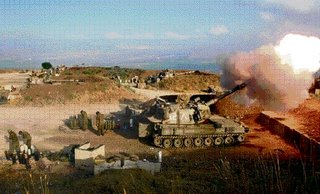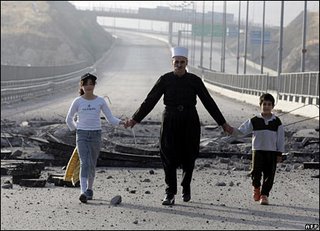





Democracy Now interviewt Noam Chomsky over het grootschalig Israelisch geweld:
'AMY GOODMAN: It's good to have you with us. Well, can you talk about what is happening now, both in Lebanon and Gaza?
NOAM CHOMSKY: Well, of course, I have no inside information, other than what's available to you and listeners. What's happening in Gaza, to start with that -- well, basically the current stage of what's going on -- there's a lot more -- begins with the Hamas election, back the end of January. Israel and the United States at once announced that they were going to punish the people of Palestine for voting the wrong way in a free election. And the punishment has been severe.
At the same time, it's partly in Gaza, and sort of hidden in a way, but even more extreme in the West Bank, where Olmert announced his annexation program, what’s euphemistically called “convergence” and described here often as a “withdrawal,” but in fact it’s a formalization of the program of annexing the valuable lands, most of the resources, including water, of the West Bank and cantonizing the rest and imprisoning it, since he also announced that Israel would take over the Jordan Valley. Well, that proceeds without extreme violence or nothing much said about it.
Gaza, itself, the latest phase, began on June 24. It was when Israel abducted two Gaza civilians, a doctor and his brother. We don't know their names. You don’t know the names of victims. They were taken to Israel, presumably, and nobody knows their fate. The next day, something happened, which we do know about, a lot. Militants in Gaza, probably Islamic Jihad, abducted an Israeli soldier across the border. That’s Corporal Gilad Shalit. And that's well known; first abduction is not. Then followed the escalation of Israeli attacks on Gaza, which I don’t have to repeat. It’s reported on adequately.
The next stage was Hezbollah's abduction of two Israeli soldiers, they say on the border. Their official reason for this is that they are aiming for prisoner release. There are a few, nobody knows how many. Officially, there are three Lebanese prisoners in Israel. There's allegedly a couple hundred people missing. Who knows where they are?
But the real reason, I think it's generally agreed by analysts, is that -- I’ll read from the Financial Times, which happens to be right in front of me. “The timing and scale of its attack suggest it was partly intended to reduce the pressure on Palestinians by forcing Israel to fight on two fronts simultaneously.” David Hearst, who knows this area well, describes it, I think this morning, as a display of solidarity with suffering people, the clinching impulse.
It's a very -- mind you -- very irresponsible act. It subjects Lebanese to possible -- certainly to plenty of terror and possible extreme disaster. Whether it can achieve any result, either in the secondary question of freeing prisoners or the primary question of some form of solidarity with the people of Gaza, I hope so, but I wouldn't rank the probabilities very high.
JUAN GONZALEZ: Noam Chomsky, in the commercial press here the last day, a lot of the focus has been pointing toward Iran and Syria as basically the ones engineering much of what's going on now in terms of the upsurge of fighting in Lebanon. Your thoughts on these analyses that seem to sort of downplay the actual resistance movement going on there and trying to reduce this once again to pointing toward Iran?
NOAM CHOMSKY: Well, the fact is that we have no information about that, and I doubt very much that the people who are writing it have any information. And frankly, I doubt that U.S. intelligence has any information. It's certainly plausible. I mean, there's no doubt that there are connections, probably strong connections, between Hezbollah and Syria and Iran, but whether those connections were instrumental in motivating these latest actions, I don't think we have the slightest idea. You can guess anything you’d like. It's a possibility. In fact, even a probability. But on the other hand, there's every reason to believe that Hezbollah has its own motivations, maybe the ones that Hearst and the Financial Times and others are pointing to. That seems plausible, too. Much more plausible, in fact.' Lees verder:
http://www.democracynow.org/article.pl?sid=06/07/14/146258




Geen opmerkingen:
Een reactie posten